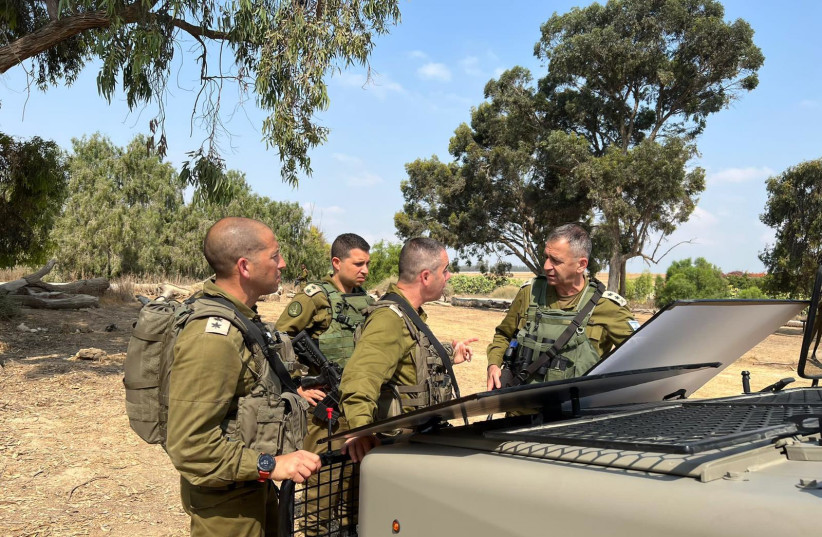IDF road closures extended for 3rd time amid Gaza tensions
The IDF has reinforced the Gaza Division with additional troops as tensions remain high in southern Israel.
The IDF has reinforced the Gaza Division with artillery, engineering, infantry, tanks and special forces, as tension remains high in southern Israel. On Thursday evening, local authorities announced that restrictions on movement in communities near the Gaza border would continue on Friday.
Despite it being reported that troops based in the South had their furloughs canceled, there was no such order given. Nevertheless, some forces will remain on base in the area.
IDF Chief of Staff Lt.-Gen. Aviv Kohavitoured the Gaza Division on Thursday and received an intelligence assessment of the situation along the border accompanied by Gaza Division Commander Brig.-Gen. Nimrod Aloni. He was also shown how troops, artillery and armored units present have prepared for any violent scenario.
Following the visit, Kohavi instructed forces to increase the military’s readiness for an escalation, strengthen defenses, and increase intelligence efforts. He also approved offensive military plans.

In a phone call with the heads of local councils that were impacted by the security restrictions, Prime Minister Yair Lapid said Israel is prepared to respond aggressively to any threat to its citizens.
“Israel is ready for any scenario, and will act aggressively against any organization that will threaten the security of the citizens of Israel, if necessary,” said Lapid.
He said he understands the disruption to daily lives, and emphasized that he will not allow the current security situation to continue much longer.
Those on the call with Lapid were Sderot Mayor Alon Davidi, Eshkol Regional Council head Gadi Yarkoni, Hof Ashkelon Regional Council head Itamar Revivo, Sdot Negev Regional Council head Tamir Idan and Sha’ar Hanegev Regional Council head Ofir Libstein.
They later spoke with Kohavi and Defense Minister Benny Gantz.
Gantz also held a situational assessment during the day with Kohavi, head of the Shin Bet (Israel Security Agency) Ronen Bar, Defense Ministry Director-General Amir Eshel and other senior officials.
According to a statement released by his office, Gantz instructed the defense establishment to “employ a variety of civilian and military measures in order to counter threats on Israel’s southern region, and to prepare operational activities in order to restore routine life and activities in the area.”
He also ordered the head of Israel’s National Emergency Authority to work with the IDF’s Home Front Command to “respond to and fulfill” the needs of Israelis living along the Gaza border who have been affected by the closures.
All operational activities in all areas will continue as planned.
Road restrictions in southern Israelremained in place for the third day over concerns of an attack by Palestinian Islamic Jihad, after Israeli security forces arrested a senior leader of the group in Jenin overnight on Monday.
Tensions spiked after Bassem Saadi, head of PIJ in the West Bank, was arrested along with his son-in-law during a raid. Saadi was seen being dragged by forces and was slightly bitten by a military dog during his arrest.
The IDF closed roads near the Strip on Tuesday. On Wednesday, it called up 100 reservists to bolster the Gaza Division to assist in securing the area and keep civilians out of areas that could be targeted by PIJ. The terrorist group has previously fired anti-tank guided missiles toward Israeli vehicles, both civilian and military.
The IDF is also on alert for any rocket fire and has placed its Iron Dome missile-defense system on alert in order to intercept any projectiles.
According to the Palestinian Quds news site, Saadi’s family said he received a blow to the back of his head that is causing him severe headaches, and “despite his old age, he was not brought to the hospital.”
Mediations to de-escalate Israeli-Palestinian tensions
Both Qatar and Egypt are trying to mediate with Hamas and PIJ in order to de-escalate the situation. Hamas is also working to prevent attacks by PIJ, including by putting pressure on the group and locating cells that might be planning to fire anti-tank-guided missiles toward Israeli targets.
Gazan laborers, who have not been able to leave the blockaded enclave for the past three days, have also begun to put pressure on the terrorist group. Israel closed the Erez crossing on Tuesday, blocking 14,000 Gazans who have permits to enter Israel from working.
Though Israel insists it is not interested in a new conflict with terrorist groups in the Gaza Strip, Defense Minister Gantz warned on Tuesday that the IDF would respond forcefully should PIJ carry out an attack.
Troops in the Southern Command and Gaza Division have been ordered to thwart any hostile activity if identified, such as a PIJ cell readying to fire rockets, mortars or anti-tank missiles. Armed drones flown by the Israel Air Force have also been prepared to strike armed cells.
By using tactics developed and used during last year’s Operation Guardian of the Walls, both ground troops and armed drones are able to identify and strike targets in real time, including missile launchers and the cells using them.
Two weeks ago, the military censor allowed the publication of information acknowledging that the IAF uses armed drones in military operations, which played a significant role in the 11 days of fighting last year.
Despite the tension, Israeli security forces continued raids in the West Bank overnight, arresting 22 Palestinians, including PIJ operatives wanted on suspicion of being involved in terrorism








.jpeg)
Comments
Post a Comment